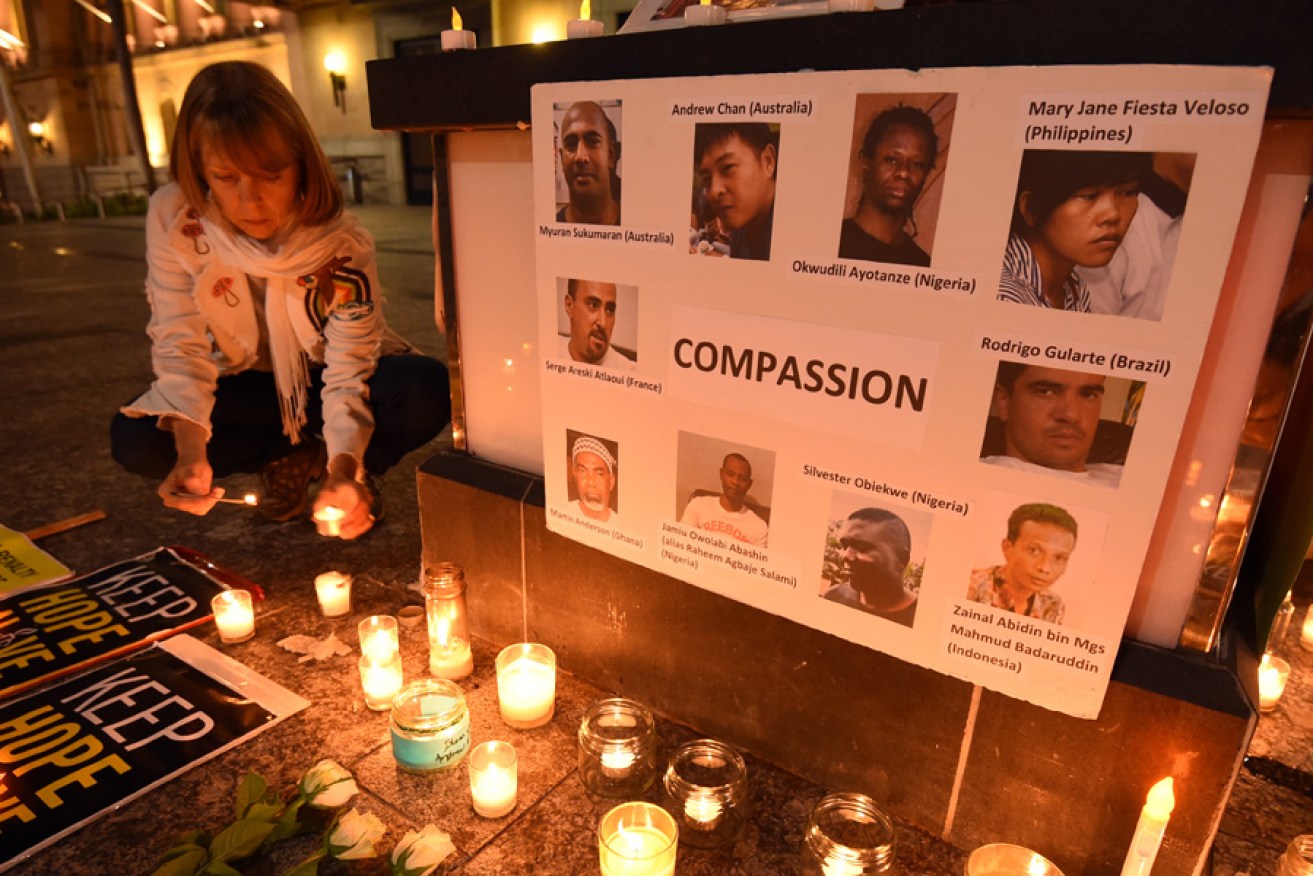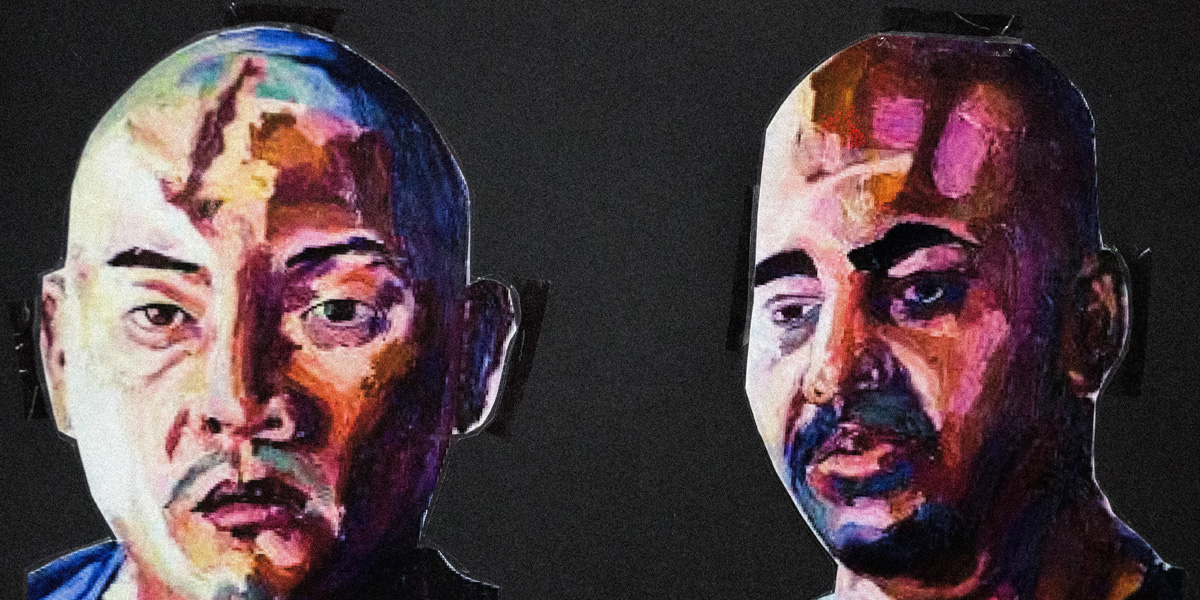Thou shalt not kill, except …


A vigil in Brisbane calling for mercy for the condemned prisoners.
Judging by the outpouring of grief today, you would imagine that Australians and our government were opposed trenchantly to the death penalty in all circumstances as a matter of national principle.
This isn’t so – it’s a lot more complicated than that, and it always has been.
Our principles on this issue are not pure – far from it. In fact, like most countries, like the Indonesians, when it comes to the death penalty we are guilty of hypocrisy.
In the horrible cases of convicted drug smugglers Andrew Chan and Myuran Sukumaran – shot overnight while singing alongside six other condemned prisoners – a collective chill has descended on our country.
Two healthy and, by all reports, changed men had their lives ended in a ghoulishly clinical fashion.
The Federal Government was angry after its pleas for clemency were rejected.
Chan’s brother Michael gave the most heart-rending – and principled – statement after visiting his condemned brother yesterday for the final time.
Calling for a moratorium on the death penalty, he described the heartbreaking scene in the Javanese prison: “Kids, mothers, cousins, brothers, sisters – you name it, they were all there and to walk out of there and to say good-bye for the last time, it’s torture and no family should go through that.”
So will we as a nation lead the international fight against the death penalty in all countries and circumstances?
That seems unlikely.
A few years ago, the Australian Government and key Opposition figures actively supported the executions of the Bali bombers.
Yes, it was a far more horrible crime than Chan and Sukumaran’s, involving the deaths of many Australians, but can we be selective in the way we call on overseas countries to apply the law of their land?
On a matter of legal principle, does it make any sense to pick and choose?
Well, no. But it’s clear that principles aren’t our guide on this emotive issue.
Back in 2006, Justice John von Doussa, then president of the Human Rights and Equal Opportunity Commission, gave a speech on the matter to the UN Association, at Ming’s Palace in Adelaide.
He pointed out that our approach to the death penalty is not governed by principle, but far more elastic concepts.
“Polls indicate that many people’s opposition to the death penalty is not a matter of principle, but dependent on where the death sentence is imposed, what crime is being punished and the level of public sympathy for those convicted.”
He quoted the case of Australian Nguyen Tuong Van, a drug smuggler hanged by the Singaporeans in 2005. Polls found that despite the majority of Australians being opposed to the death penalty, a majority felt the death penalty should be imposed on Nguyen.
“Some longstanding opponents to the death penalty have in recent times expressed support for the death penalty for terrorist acts,” von Doussa said.
“After the Bali bombers were sentenced to death, political leaders, who have previously opposed the death penalty, remained silent or applauded the Indonesian Court’s decision to sentence the men to death. It was, unsurprisingly, a popular decision – a Ray Morgan poll found 77 per cent of Australians thought the death penalty should be carried out on Amrozi.”

Portraits of Chan and Sukumaran, painted by the latter who became an accomplished painter while in prison. AAP photo
Then prime minister John Howard, who claimed to be opposed in principle to capital punishment, supported the execution of the Bali bombers, as did then Opposition leader Kevin Rudd.
In 2007, Howard was upfront about his hypocrisy.
“I find it impossible myself as an Australian, as Prime Minister, and as an individual, to argue that those executions should not take place when they have murdered my fellow countrymen and women.”
Tellingly, he said he did not support the death penalty for Australia and would argue for condemned Australians overseas to be spared.
Indonesian President Joko Widodo has been slammed by Australian newspapers for taking virtually the same stance – fighting vigorously to save condemned Indonesians overseas while insisting the penalty be enforced on foreigners found guilty of capital crimes in Indonesia.
Former Labor minister Barry Jones, writing in March, skewered the hypocrisy of the Indonesians and Australians on this issue.
“Jokowi (Widodo) keeps repeating that the executions are just routine. They are ‘all a matter of law enforcement’ and he is just ‘upholding the law’. But it is far more than that. There has been a complete failure of consistency about the Indonesian way of death for decades. He is remaking the law, almost casually, by whim.”
As for us, including the role of the Federal Police in tipping off the Indonesians about the Bali Nine, Jones wrote: “Australia has been monumentally hypocritical on the death penalty abroad. We will not extradite persons held here to death penalty jurisdictions, even to our close ally the United States.
“Nevertheless, the Australian Federal Police (AFP) has played an atrocious role, which it still defends on the grounds that sharing information with the Indonesian police provides more, in aggregate, for us than it does for them. Chan, Sukumaran and the rest of the Bali Nine should have been arrested in Australia before they flew to Bali rather than being arrested in Bali on the basis of information provided by the AFP.”
If Australia truly wants to end the brutality of state-sanctioned murder, we must be better than this.
We must fight for an end to the death penalty as a matter of principle, in all cases, in all jurisdictions, regardless of patriotism or our subjective judgements about people’s rehabilitation or the extent of their crimes.
As von Doussa said: “Australia’s opposition to the death penalty should be clear and consistent, regardless of the crime, regardless of the country, regardless of the citizenship of the convicted. In a regional context, opposing the death penalty for some crimes but not for others, for some criminals but not our own citizens, opens Australia to charges of hypocrisy and undermines our commitment to the universal abolition of the death penalty.”
It’s too late to save Chan and Sukumaran and their families, who have been condemned to a life of grief, but they will not be the last to tread the terrible path to the execution ground – that is certain.
David Washington is editor of InDaily.




